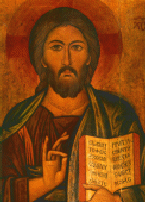|
Click here for the full RGT2430H
syllabus (PDF) for the next academic year. The materials
contained on this web-site complement the full syllabus. [Being
revised for Jan. 2005].
|
|
|
A study of the life and works of major patristic authors who shaped
and influenced the Eastern Christian tradition, including Ignatius,
Irenaeus, Origen, Athanasius, John Chrysostom, the Cappadocians,
Maximus the Confessor, Symeon the New Theologian, Nicholas Cabasilas,
Gregory Palamas. Lectures-seminar, reflection papers, major paper.
[Cross-listed to Theology].
a. Reflection paper #1 = 25%
b. Class Presentation = 10%
c. Research Essay = 45%
d. In-Class/Seminar participation 20%
1. John Meyendorff. Byzantine Theology: Historical Trends and
Doctrinal Themes. NY: Fordham, 1979.
2. Jaroslav Pelikan. The Spirit of Eastern Christendom. Vol.
2. The Christian Tradition: A History of the Development of Doctrine.
Chicago: Chicago, 1974.
3. Course pack photocopies & on-line readings (more details
at first class).
1. On-line Powerpoint summary presentation of major
figures in the Eastern Orthodox Tradition (from my presentation
at World Youth Day, Toronto).
2. On-line Powerpoint summary presentation of the history and ecumenical
relations of the various Eastern
churches (from my presentation at the World Youth Day, Toronto).
3. Selected images of icons
used in course lectures.
4. Table Comparison
of Iconophile and Iconoclast doctrines.
5. Information on assignments and researching.
6. Other course
syllabi and links to resources in Eastern Christianity (via
the Wabash Centre).
1. Introduction
- methodology and researching in patristics; historical-critical
method; Tradition and doctrine; NT witness; kerygma and doctrine.
2. Apostolic & Apologetic Literature-
(0-150)
- Ignatius: ministry and ecclesiological themes in Eastern Christianity;
Irenaeus: christology, cosmology and soteriology.
Maps:
Review this map of the
growth of Christianity and this early
Byzantium map (PDF) to give you a sense of the world of Jesus,
and the early Christian writers. It is very important for
you to get a sense of "ancient geography."
3. Alexandria: Clement, Origen, and Athanasius
- Origen & Scripture, philosophy and cosmology; Athanasius and
christological terminology; the Imperial Church; the early councils;
early monasticism.
4. The Armenian and Syriac Traditions (350-400)
and John Chrysostom
- Aphrahat; Bardaisan; Ephraim the Syrian; Jacob of Edessa; Philoxenus.
5. Cappadocians and Their Influence (350-400)
- the Cappadocians and Hellenism; christology & pneumatology;
spirituality; eschatology; Macrina.
6. Christology Unfolds, the Theotokos and
Eastern Schisms (431-500)
- Theodore Mopseustia; Nestorius; Ephesus (431); Cyril; Chalcedon
(451); modern Assyrian and Oriental Orthodox churches.
7. Pseudo-Dionysius, Later Councils and Maximus
Confessor (500-700)
- monotheletism and cosmology; Constantinople II (553) and III (680).
8. Iconoclastic Crisis and the Triumph of
Orthodoxy at Nicea II (700-787)
- John of Damascus; Theodore the Studite; Theodore Abu Q'urrah;
icons and christology.
9. Ninth to Eleventh Centuries
- Photius, the filioque and primacy; crises in E & W; importance
of Byzantine monasticism.
10. The Later Byzantine Hesychastic &
Liturgical Traditions (1100-1400)
- Symeon the New Theologian; Gregory Palamas; the sacking of Constantinople.
11. Attempts at Ecclesial Communion &
the Last Flourishing of Byzantium (-1453)
- Nicholas Cabasilas; councils of Lyons, Florence and the fall of
Byzantium.
12. The Spread of Christianity to Kievan-Rus'
(800-1600)
- Cyril & Methodius; the conversion of Rus'; encounter and unions
with the west.
13. Conclusion
- overview of themes; later developments.
|
